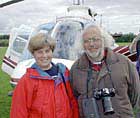

[Border reivers home]
![]()
 |
Newcastleton from the air |
From the 12th to the 16th century, the land straddling the border of England and Scotland was rife with thievery, cattle rustling, extortion and murder -- committed by men from all social classes who came to be known collectively as the 'Border reivers'.
As their legacy, they gave us the words 'blackmail' and 'bereavement'. But they also were the inspiration behind probably the most important ballads of the English language (in its Scottish form). And their most prestigious promoter was the writer Sir Walter Scott, himself a descendant of reivers.
Three teams of 'history hunters' examine the historical truth behind some of these ballads, trying to tease out gory and mundane details from the literary gloss.
the quests
Sandra Inglis
Stewart Inglis
Martyn Inglis
Isabel Elliot
They want to establish the truth behind the ballad 'Johnie Armstrang' and find the important locations mentioned in the song. Sandra Inglis (née Armstrong) believes herself to be the 16th direct descendant of Johnie Armstrang.
Joan Robson
Barbara Smith
Duncan Telford
Iver Gray
All are descended from reivers and want to trace the smuggling route across the Wastes of Bewcastle, which is featured in the ballad 'Hobbie Noble'.
Douglas Elliot
Rob Fraser
John Nichol
They first want to discover the historical facts behind 'Foray of Elibank' and the legend of 'Mucklemouth Meg', from whom Rob's wife is descended. Then they want to find out whether there is any truth in the ballad 'Kinmont Willie'.
 |
Joan Robson of the Hobbie Noble team prepares to follow the trail by helicopter with Mick Aston |
Acknowledgements
Thanks to the people of the Borders. The webmaster would like to thank David Bowcock of Cumbria Record Office for permission to reproduce the maps. All aerial photographs were taken by Mick Aston.